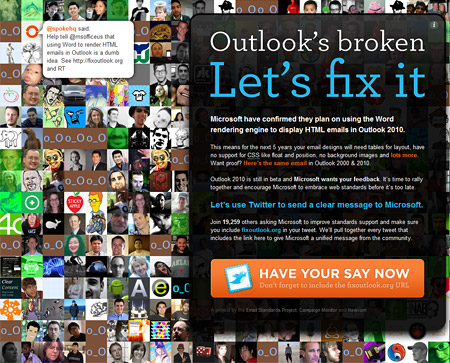The Email Standards Project’s message to Microsoft: Outlook’s broken – Let’s fix it.
Microsoft have announced that Outlook 2010 will use the crippled Word rendering engine to display HTML emails (as does Outlook 2007). In response The Email Standards Project have launched a campaign to send a clear message to Microsoft: Outlook’s broken – Lets fix it.

The campaign leveredges Twitter to rally the web design community around the issue, and a realtime mosaic of the tweets can be viewed at fixoutlook.org. The site is worth a visit for this feature alone!
Further reading
Microsoft to ignore web standards in Outlook 2010 – enough is enough
2 thoughts on “The Email Standards Project’s message to Microsoft: Outlook’s broken – Let’s fix it.”
Comments are closed.
Having done production work for an email marketing company, making emails render consistently across various browsers is a far nastier proposition than just supporting IE6. This would be a tremendous blow to an already crippled medium. Unless, of course, the render engine is better than the FIx Outlook campaign would lead you to believe.
While I’m in favor of the message, and I did tweet to support the campaign, there is a part of me that shies away from efforts that try to bully (a bit harsh, I know) a company into making a specific decision. Either way, they could have done better than the insensitive and stubborn response Microsoft ultimately delivered.
@Ivan – Perhaps if The Email Standards Project attempted to start an open dialogue with Microsoft they might get a warmer response.
However, William Kennedy’s response seemed to miss the point. HTML email designers don’t care if Word is used to compose HTML emails: what concerns us is the fact that Word is used to render emails which have been professionally coded according to the HTML spec.
I agree with William’s observation that “there is no widely-recognized consensus in the industry about what subset of HTML is appropriate for use in e-mail for interoperability”. That is the crux of the problem with HTML email, but it is unfortunate that Microsoft have chosen to sit on their hands until such a consensus magically arrives.
In the meantime I expect Microsoft will do what they always do when one of their products dominates a market: refuse to improve it, and force developers to work around their software’s quirks. I imagine the only thing that will compel Microsoft to “fix Outlook” are market forces, and currently Outlook has no serious competitor on the desktop.